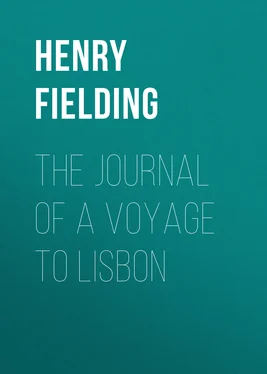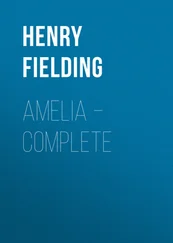Henry Fielding - The Journal of a Voyage to Lisbon
Здесь есть возможность читать онлайн «Henry Fielding - The Journal of a Voyage to Lisbon» — ознакомительный отрывок электронной книги совершенно бесплатно, а после прочтения отрывка купить полную версию. В некоторых случаях можно слушать аудио, скачать через торрент в формате fb2 и присутствует краткое содержание. Жанр: foreign_prose, foreign_antique, Путешествия и география, на английском языке. Описание произведения, (предисловие) а так же отзывы посетителей доступны на портале библиотеки ЛибКат.
- Название:The Journal of a Voyage to Lisbon
- Автор:
- Жанр:
- Год:неизвестен
- ISBN:нет данных
- Рейтинг книги:4 / 5. Голосов: 1
-
Избранное:Добавить в избранное
- Отзывы:
-
Ваша оценка:
- 80
- 1
- 2
- 3
- 4
- 5
The Journal of a Voyage to Lisbon: краткое содержание, описание и аннотация
Предлагаем к чтению аннотацию, описание, краткое содержание или предисловие (зависит от того, что написал сам автор книги «The Journal of a Voyage to Lisbon»). Если вы не нашли необходимую информацию о книге — напишите в комментариях, мы постараемся отыскать её.
The Journal of a Voyage to Lisbon — читать онлайн ознакомительный отрывок
Ниже представлен текст книги, разбитый по страницам. Система сохранения места последней прочитанной страницы, позволяет с удобством читать онлайн бесплатно книгу «The Journal of a Voyage to Lisbon», без необходимости каждый раз заново искать на чём Вы остановились. Поставьте закладку, и сможете в любой момент перейти на страницу, на которой закончили чтение.
Интервал:
Закладка:
But even such a panacea one of the greatest scholars and best of men did lately apprehend he had discovered. It is true, indeed, he was no physician; that is, he had not by the forms of his education acquired a right of applying his skill in the art of physic to his own private advantage; and yet, perhaps, it may be truly asserted that no other modern hath contributed so much to make his physical skill useful to the public; at least, that none hath undergone the pains of communicating this discovery in writing to the world. The reader, I think, will scarce need to be informed that the writer I mean is the late bishop of Cloyne, in Ireland, and the discovery that of the virtues of tar-water.
I then happened to recollect, upon a hint given me by the inimitable and shamefully-distressed author of the Female Quixote, that I had many years before, from curiosity only, taken a cursory view of bishop Berkeley's treatise on the virtues of tar-water, which I had formerly observed he strongly contends to be that real panacea which Sydenham supposes to have an existence in nature, though it yet remains undiscovered, and perhaps will always remain so.
Upon the reperusal of this book I found the bishop only asserting his opinion that tar-water might be useful in the dropsy, since he had known it to have a surprising success in the cure of a most stubborn anasarca, which is indeed no other than, as the word implies, the dropsy of the flesh; and this was, at that time, a large part of my complaint.
After a short trial, therefore, of a milk diet, which I presently found did not suit with my case, I betook myself to the bishop's prescription, and dosed myself every morning and evening with half a pint of tar-water.
It was no more than three weeks since my last tapping, and my belly and limbs were distended with water. This did not give me the worse opinion of tar-water; for I never supposed there could be any such virtue in tar-water as immediately to carry off a quantity of water already collected. For my delivery from this I well knew I must be again obliged to the trochar; and that if the tar-water did me any good at all it must be only by the slowest degrees; and that if it should ever get the better of my distemper it must be by the tedious operation of undermining, and not by a sudden attack and storm.
Some visible effects, however, and far beyond what my most sanguine hopes could with any modesty expect, I very soon experienced; the tar-water having, from the very first, lessened my illness, increased my appetite, and added, though in a very slow proportion, to my bodily strength. But if my strength had increased a little my water daily increased much more. So that, by the end of May, my belly became again ripe for the trochar, and I was a third time tapped; upon which, two very favorable symptoms appeared. I had three quarts of water taken from me less than had been taken the last time; and I bore the relaxation with much less (indeed with scarce any) faintness.
Those of my physical friends on whose judgment I chiefly depended seemed to think my only chance of life consisted in having the whole summer before me; in which I might hope to gather sufficient strength to encounter the inclemencies of the ensuing winter. But this chance began daily to lessen. I saw the summer mouldering away, or rather, indeed, the year passing away without intending to bring on any summer at all. In the whole month of May the sun scarce appeared three times. So that the early fruits came to the fullness of their growth, and to some appearance of ripeness, without acquiring any real maturity; having wanted the heat of the sun to soften and meliorate their juices. I saw the dropsy gaining rather than losing ground; the distance growing still shorter between the tappings. I saw the asthma likewise beginning again to become more troublesome. I saw the midsummer quarter drawing towards a close. So that I conceived, if the Michaelmas quarter should steal off in the same manner, as it was, in my opinion, very much to be apprehended it would, I should be delivered up to the attacks of winter before I recruited my forces, so as to be anywise able to withstand them.
I now began to recall an intention, which from the first dawnings of my recovery I had conceived, of removing to a warmer climate; and, finding this to be approved of by a very eminent physician, I resolved to put it into immediate execution. Aix in Provence was the place first thought on; but the difficulties of getting thither were insuperable. The Journey by land, beside the expense of it, was infinitely too long and fatiguing; and I could hear of no ship that was likely to set out from London, within any reasonable time, for Marseilles, or any other port in that part of the Mediterranean.
Lisbon was presently fixed on in its room. The air here, as it was near four degrees to the south of Aix, must be more mild and warm, and the winter shorter and less piercing.
It was not difficult to find a ship bound to a place with which we carry on so immense a trade. Accordingly, my brother soon informed me of the excellent accommodations for passengers which were to be found on board a ship that was obliged to sail for Lisbon in three days. I eagerly embraced the offer, notwithstanding the shortness of the time; and, having given my brother full power to contract for our passage, I began to prepare my family for the voyage with the utmost expedition.
But our great haste was needless; for the captain having twice put off his sailing, I at length invited him to dinner with me at Fordhook, a full week after the time on which he had declared, and that with many asseverations, he must and would weigh anchor.
He dined with me according to his appointment; and when all matters were settled between us, left me with positive orders to be on board the Wednesday following, when he declared he would fall down the river to Gravesend, and would not stay a moment for the greatest man in the world. He advised me to go to Gravesend by land, and there wait the arrival of his ship, assigning many reasons for this, every one of which was, as I well remember, among those that had before determined me to go on board near the Tower.
THE VOYAGE
WEDNESDAY, June 26, 1754. – On this day the most melancholy sun I had ever beheld arose, and found me awake at my house at Fordhook. By the light of this sun I was, in my own opinion, last to behold and take leave of some of those creatures on whom I doted with a mother-like fondness, guided by nature and passion, and uncured and unhardened by all the doctrine of that philosophical school where I had learned to bear pains and to despise death. In this situation, as I could not conquer Nature, I submitted entirely to her, and she made as great a fool of me as she had ever done of any woman whatsoever; under pretense of giving me leave to enjoy, she drew me in to suffer, the company of my little ones during eight hours; and I doubt not whether, in that time, I did not undergo more than in all my distemper.
At twelve precisely my coach was at the door, which was no sooner told me than I kissed my children round, and went into it with some little resolution. My wife, who behaved more like a heroine and philosopher, though at the same time the tenderest mother in the world, and my eldest daughter, followed me; some friends went with us, and others here took their leave; and I heard my behavior applauded, with many murmurs and praises to which I well knew I had no title; as all other such philosophers may, if they have any modesty, confess on the like occasions.
In two hours we arrived in Rotherhithe, and immediately went on board, and were to have sailed the next morning; but, as this was the king's proclamation-day, and consequently a holiday at the custom-house, the captain could not clear his vessel till the Thursday; for these holidays are as strictly observed as those in the popish calendar, and are almost as numerous. I might add that both are opposite to the genius of trade, and consequently contra bonum publicum.
Читать дальшеИнтервал:
Закладка:
Похожие книги на «The Journal of a Voyage to Lisbon»
Представляем Вашему вниманию похожие книги на «The Journal of a Voyage to Lisbon» списком для выбора. Мы отобрали схожую по названию и смыслу литературу в надежде предоставить читателям больше вариантов отыскать новые, интересные, ещё непрочитанные произведения.
Обсуждение, отзывы о книге «The Journal of a Voyage to Lisbon» и просто собственные мнения читателей. Оставьте ваши комментарии, напишите, что Вы думаете о произведении, его смысле или главных героях. Укажите что конкретно понравилось, а что нет, и почему Вы так считаете.












